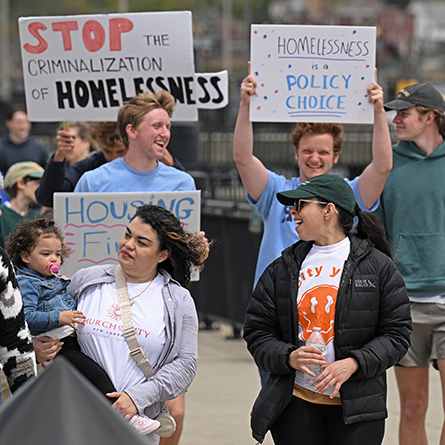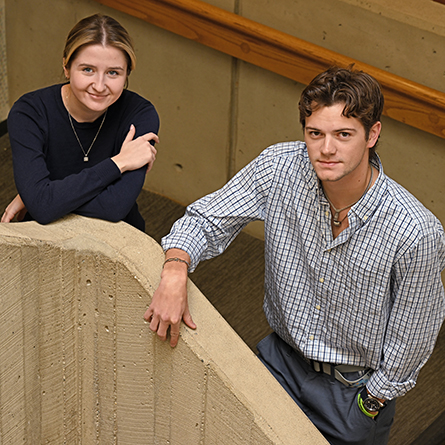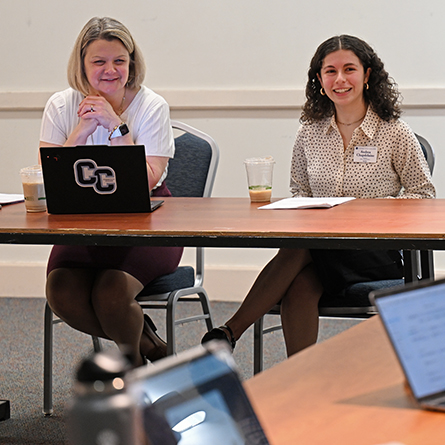
Where the need is greatest: Students help Ukrainians abroad
Two Conn students took separate trips abroad over winter break to help Ukrainian residents and refugees.
Olha Vasyliv ’23 went home to Kyiv for the first time since before the war broke out to visit her family. With advice from child psychologists and a grant from Conn’s Center for the Critical Study of Race and Ethnicity, she also supplied her alma mater, European Collegium, with art therapy tools to help students cope with the stress of war.
Meanwhile, Ethan Bankowski ’24 assisted the International Medical Relief organization as part of a crew of 14 doctors, nurses, physician assistants and one other non-medical volunteer to care for Ukrainian refugees in Poland.
Vasyliv, a sociology and French double major, was studying abroad in Paris last year and had a flight booked to Ukraine on Feb. 25, 2022. But then Russia invaded on Feb. 24. So, finally going home last month and seeing her family and her country—with daily routines in place, although modified—has been healing for her.
“I lived through a missile attack when I went home for break, and I was not panicking at the moment because everybody knew what to do. There is a procedure of where to go,” she said.
Vasyliv’s 9-year-old brother attends European Collegium and her mother is a principal there. When air raid sirens blare, sometimes for several hours a day, hundreds of students seek shelter in the school’s basement. Electricity is rationed and everyone gets about six unpredictable hours a day—sometimes all at once, and sometimes broken up into intervals.
“They have to keep themselves occupied, and the school already spent a lot of money on electricity generators to cover the basic needs,” Vasyliv says, “so things like psychological support is very, very needed and I’m happy that I was able to gauge the needs of the psychologists and give back.”
Bankowski looked into volunteering in Ukraine, but found it prohibitive. The biochemistry, cellular and molecular biology major, who intends to become a doctor, had been seeking an opportunity to gain more experience in the public health field.
He says, “I’ve always been interested in international humanitarian health. It’s something I want to do with my life going forward, so I was seeking opportunities to volunteer anywhere in the world. The need in this crisis in particular with the Russian-Ukrainian War was most compelling.”
Nearly 10 million Ukrainian refugees have crossed the border to Poland since the invasion last year, and most of them lack access to medical care. Many left their medications behind or have long since run out.
“IMR wants anyone who’s willing to go,” Bankowski says. “I think it’s around 1.5 million refugees right now who are just waiting for something to change before they can get help. All of these people are sitting and waiting in camps sort of in a stalemate, and so no one’s really taking care of their health, which is where these kinds of groups come in.”
Bankowski and his group flew to Poland from the U.S. with donations including cold weather gear and medications.
“We would go to a new refugee shelter every day, set up a temporary clinic there, and just treat as many people as we could,” he recalls. “Some people had longstanding health problems and hadn’t had a chance to see a doctor. Some people just needed to talk to someone. There was a lot of anxiety and a lot of depression in these communities.”
Both Vasyliv and Bankowski plan to continue their respective outreach efforts. Vasyliv was nominated for a Davis Projects for Peace grant from Conn to create upcoming summer camps for refugee children at European Collegium and a school in Austria. For his part, Bankowski was inspired by the doctors on his recent trip who use much of their annual vacation time on similar volunteer missions. He intends to do the same in the future.
“I can’t imagine living the life of a doctor and not being involved with trips like this,” Bankowski says.
Vasyliv adds, “I’m trying to use as many opportunities as I can to help give back to my community, because the guilt is there and I feel like every Ukrainian I talk to who is abroad feels guilty about not being present—but at the same time, we have to keep our own lives going and it’s probably the best way to do as much as we can with what we have.”

